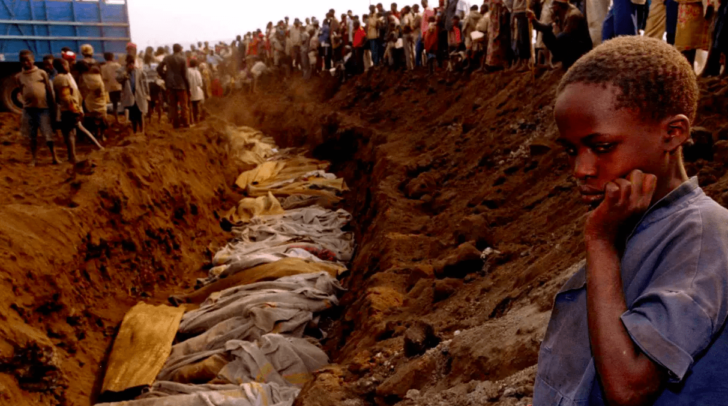A Rwandan refugee girl stares at a mass grave where dozens of bodies have been laid to rest, July 20, 1994.
Newly published letters show that the desire to ‘score a PR victory’ – not empathy – was key in decision to offer help to victims of the massacres
By Chaim Levinson, reposted from the Israeli newspaper Ha’aretz
The international community awoke too late to the humanitarian crisis in the aftermath of the 1994 genocide in Rwanda, which claimed the lives of some 800,000 people, most of them ethnic Tutsis.
It emerges that in Israel, there were those who wanted to offer aid to the victims while the genocide was raging, and there were officials who were opposed to it.
Discussions about offering aid to Rwanda started at the end of May, a month and a half after the genocide had started.
“A shipment of medicine and supplies at a time when Kupat Holim Clalit (Israel’s largest HMO) is in crisis over a budget shortfall will become a source of public disdain,” Prof. Mordechai Shani, then director general of the Health Ministry, wrote to the Foreign Ministry in June.
“If the Foreign Ministry wants to do public relations, it alone shall bear responsibility for it,” added Shani, who went on to be an Israel Prize laureate in 2009.

Health Ministry documents published this week by the Israel State Archive provide a behind-the-scenes glimpse of the country’s assistance to war-torn Rwanda at the time. There were those who saw it as an opportunity to do conduct public relations for Israel on an international scale, and others who saw offering aid as a huge waste of money. What they all shared, however, was an indifference to the horrible extent of the months-long massacres.
For example, the Zambian government asked Israel for assistance in immunizing its soldiers, who were tasked with deploying in Rwanda to prevent violence, because it lacked the necessary inoculations. The Foreign Ministry wrote a letter to the Health Ministry, saying, “We recommend responding to this modest request through which we can score a double public relations victory – directly with Zambia, and indirectly, with Rwanda.”
Doctors and other medical staff were supposed to be sent to Rwanda via the Médecins Sans Frontières (Doctors Without Borders) organization to assist survivors of the massacres. But a problem arose: Pnina Herzog, the Health Ministry’s deputy director general for foreign relations, discovered that the MSF was not particularly empathetic toward Israelis, and that any staff or volunteers who would be dispatched would not be recognized as Israelis as such, but would join other teams in Rwanda.

Herzog hastened to write to her ministry’s director general: “Since the aim of the operation is public relations, the question arises as to whether it wouldn’t be better to send food, medicine and supplies, and to give this proper publicity instead of sending people and exposing them to disease and difficult conditions.”
In the end, according to the documents, MSF didn’t want to use Israelis and their delegation was cancelled. Instead a truck was sent that included “$10,000 worth of high-protein bars and $10,000 worth of medicine. The truck will be accompanied by a journalist from Channel 2. When it arrives, the cargo will be handed over in the presence of Foreign Ministry officials and local UN representatives.”
Time went by and public pressure grew. At the end of July 1994, the government decided to send an Israel Defense Forces medical delegation to Rwanda. On the day of the flight, the head of emergency services at the Health Ministry, Yosef Arad, sent a letter to his colleagues: “I’ve been asked to help with equipment from our emergency stockpiles and I replied in the negative to all these appeals since I have no other instructions. I’ve been asked for pajamas for adults and children, and intravenous needles. All those who have asked for aid stress that we will not receive any payment for what we provide. The pressure is great because the plane to Rwanda leaves tonight. Requesting instructions.”
The plane departed and Arad fired off an angry letter to the IDF.
“Among the medicines taken to Rwanda were supplies stored next to IDF storage depots, including Rafapen and Erythromycin syrup. I must point out,” Arad wrote, “that these are medicines that are not military property. With all due understanding for the aid the country is providing for Rwanda, and we are in favor of assisting – there was no room for taking these medicines without the appropriate approval.”





